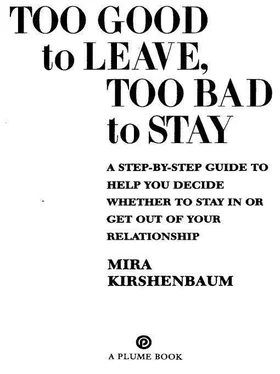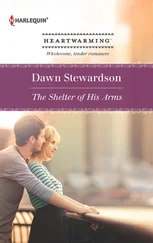Kirshenbaum, Mira - Too Good to Leave, Too Bad to Stay
Здесь есть возможность читать онлайн «Kirshenbaum, Mira - Too Good to Leave, Too Bad to Stay» весь текст электронной книги совершенно бесплатно (целиком полную версию без сокращений). В некоторых случаях можно слушать аудио, скачать через торрент в формате fb2 и присутствует краткое содержание. Жанр: Психология. Описание произведения, (предисловие) а так же отзывы посетителей доступны на портале библиотеки ЛибКат.
- Название:Too Good to Leave, Too Bad to Stay
- Автор:
- Жанр:
- Год:неизвестен
- ISBN:нет данных
- Рейтинг книги:3 / 5. Голосов: 1
-
Избранное:Добавить в избранное
- Отзывы:
-
Ваша оценка:
- 60
- 1
- 2
- 3
- 4
- 5
Too Good to Leave, Too Bad to Stay: краткое содержание, описание и аннотация
Предлагаем к чтению аннотацию, описание, краткое содержание или предисловие (зависит от того, что написал сам автор книги «Too Good to Leave, Too Bad to Stay»). Если вы не нашли необходимую информацию о книге — напишите в комментариях, мы постараемся отыскать её.
Too Good to Leave, Too Bad to Stay — читать онлайн бесплатно полную книгу (весь текст) целиком
Ниже представлен текст книги, разбитый по страницам. Система сохранения места последней прочитанной страницы, позволяет с удобством читать онлайн бесплатно книгу «Too Good to Leave, Too Bad to Stay», без необходимости каждый раз заново искать на чём Вы остановились. Поставьте закладку, и сможете в любой момент перейти на страницу, на которой закончили чтение.
Интервал:
Закладка:
Finally I urged her to check out whether her sister’s offer was serious. She came back the following week and said she had a long talk with her sister. After her sister ran through a long list of objections, it got through to her that her sister really didn’t want her to come stay with her and wasn’t really welcoming her.
She never again said she wanted to end her relationship. It’s not that the relationship was any better—it still had its problems. But the precise degree of bearability of those problems could be measured by the fact that it felt worthwhile for this woman to leave when she thought she had someplace great to go to and it didn’t feel worthwhile to leave when she had nowhere to go to. Years later she and her husband are still together. Remembering people like this woman and Matt and Donna—that’s why it’s important to reexamine your options. They don’t change the reality of your relationship, but a clear view of your options may very well change how you feel about the reality of your relationship.
PERSPECTIVES: “BUT WHAT ABOUT THE CHILDREN?”
If you have young children living at home, this Perspectives is for you. Certainly thinking about your children is part of your thinking about what awaits you on the other side if you and your partner break up.
My guess is you’re torn between two thoughts about this. On the one hand, you know that divorce isn’t good for the children psychologically and emotionally, and it’s an incredible, stressful, expensive hassle for the parents. On the other hand, you know how bad it is for children to grow up with parents whose bad relationship spoils the family atmosphere.
The two thoughts you’re torn between are not only correct, but they actually sum up all the volumes ever written about the impact of divorce on children. Divorce isn’t good for children but neither is staying in a relationship that’s too bad to stay in.
The problem you face now is how to include children in the stay or leave decision so that you’re fair to yourself but you’re also fair to them.
Here’s what I’ve found works best for almost everybody. You’ve got to keep things clear. That means you’ve got to decide whether this relationship in itself is too bad to stay in or too good to leave. I know your children are extremely important to you, but they’re separate from this decision, in the same way that your relationship with your children is separate from your relationship with your partner.
Focus on the relationship itself. If by the end of this book you can see that your relationship is too bad to stay in and that you’ll be happiest leaving, then you should leave.
Each diagnostic question focuses on some aspect of the relationship that is so important that it actually made a huge difference to people’s happiness. Any guideline that points to leaving points to something that poisons the environment your children are growing up in. If a relationship is too bad to stay in according to the guidelines in this book, then it’s too bad to stay in when there are children.
But children do make a difference and the differences are these: First, this chapter focuses on practicalities that, when you see them, make you change the way you feel about staying or leaving. These practicalities could certainly include the realities involving children. I’m talking about things like having infants or toddlers that need tremendous amounts of attention. The likelihood or unlikelihood of the noncustodial parent paying childcare. The difficulty of finding someone to look after the kids while you work. The scarcity of time for yourself. You’ve probably thought about most of these already. If not, just ask some of your friends.
Second, here’s the difference having children can make. They can appropriately affect the timing of your decision. If one of your children is going through a particularly difficult time right now, waiting a bit might be in order. And children should affect how you go about implementing your decision. A good pediatrician or family therapist can make wonderful suggestions on how to help children cope with a divorce. And children should also have some input into the decisions you and your partner make about who will live where. All these issues are really outside the scope of this book, and I’ll trust you to look into them if it turns out you need to.
But by themselves children don’t determine whether you will be happiest leaving or staying.
Some people hearing this talk about selfish adults and the devastating psychological impact of divorce on children. But as I said at the beginning of this Perspectives, you already know that divorce and staying in a bad family atmosphere both have a negative impact on children.
It’s important not to overstate the negative impact of divorce on children. Psychologically speaking, the studies that show the greatest negative impact of divorce on children delve into the psyches of children of divorced parents without delving into the psyches of comparable children of comparable parents who did not divorce. So when these studies drew their conclusions they were essentially comparing the real children whose parents had divorced with an ideal image of children whose parents had an ideal relationship.
But you can’t compare the ideal to the real. The psychological life your children will lead if you and your partner divorce can only be compared to the psychological life they’ll lead if the two of you stay together. And imagine what kind of psychological life that will be if you stay in a relationship that in fact is too bad to stay in.
As I’ve said before, this is a book about happiness. If your relationship is too good to leave in spite of its problems, then you and your children will be happy if you work on the relationship and make it as good as it can be. However, if the conditions in it are so bad that most people in your situation said they were happy they left, then you and your children will be happy moving on to new and better lives.
14
R-E-S-P-E-C-T
Issue: Do You Respect Each Other?
Respect is the soil out of which self-esteem grows. But the fighting and familiarity of relationships is the soil out of which disrespect grows. That’s the problem and the issue we have to face here.
We all vitally need to feel respected—overall, deep-down, and in the ways that are most important to us. And we need to respect our partners, if for nothing else than as a resource in our lives. But if there’s stuff that goes on universally and inevitably in relationships that germinates seeds of disrespect, then disrespect is a problem for all of us. That means I can’t just say, “What? He doesn’t respect you? You’ve got to leave!” There’s so much disrespect in so many relationships that if people acted on this we’d be living in a world of singles.
People are hungry for respect in relationships as they’re hungry for nothing else. And they’re just as hungry to feel respect for their partners as they are to receive it.
So the challenge here is to understand where to draw the line. It’s to understand where problems with respect cross over from being something like rush-hour traffic—an unpleasantness we can live with, maybe even cope with, maybe even overcome—and turn instead into something that damages us psychologically.
STEP #24: WHEN DISRESPECT GOES Too FAR
Let’s put things in perspective. What is normal disrespect, the kind of stuff that goes on in most relationships? We’ve got to know this because the kind of disrespect that turns an iffy relationship into one that’s clearly too bad to stay in must be much more extreme and much more damaging than this normal disrespect. We’ve also got to know this to be able to see the levels of respect that might turn an iffy relationship into one that’s clearly too good to leave.
Читать дальшеИнтервал:
Закладка:
Похожие книги на «Too Good to Leave, Too Bad to Stay»
Представляем Вашему вниманию похожие книги на «Too Good to Leave, Too Bad to Stay» списком для выбора. Мы отобрали схожую по названию и смыслу литературу в надежде предоставить читателям больше вариантов отыскать новые, интересные, ещё непрочитанные произведения.
Обсуждение, отзывы о книге «Too Good to Leave, Too Bad to Stay» и просто собственные мнения читателей. Оставьте ваши комментарии, напишите, что Вы думаете о произведении, его смысле или главных героях. Укажите что конкретно понравилось, а что нет, и почему Вы так считаете.












